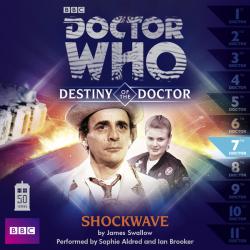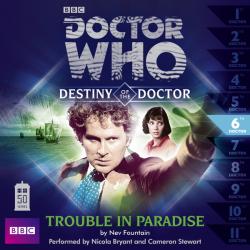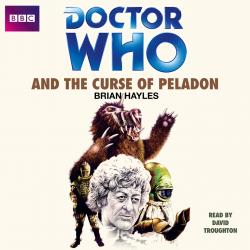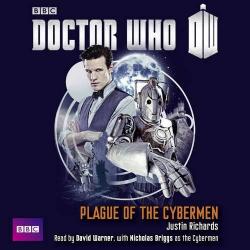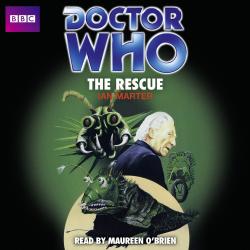Destiny of the Doctor: Enemy Aliens
Monday, 26 August 2013 - Reviewed by
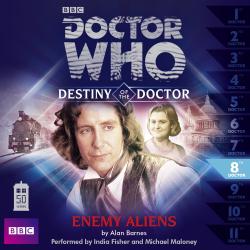
Destiny of the Doctor: Enemy Aliens
Released by AudioGo
Produced by Big Finish
Written by Alan Barnes
Directed by John Ainsworth
Released: August 2013
In every chain, it seems, there must be a weak link. For seven months, across a variety of accomplished instalments, the Destiny franchise has succeeded in engaging this reviewer’s interest thoroughly thanks to strong characterisation, defined and unique performances from each cast member involved and above all the faithfulness of the restorations of Doctor Who’s various eras. However, Enemy Aliens struggles to retain these contributory aspects in any great measure, resulting in the weakest instalment of the series so far.
Perhaps the most notable shortcoming of this lacklustre Eighth Doctor adventure becomes present as early as the premise set-up in its opening moments. Much as in the Sixth Doctor entry Trouble In Paradise, the Doctor and Charley are called upon by the Eleventh Doctor to unravel a mystery in 1930s London. Whether it’s the familiarity of the scene in which the inter-Doctor discussion first takes place, or indeed of a pre-war setting such as this, either way there’s a sense instantly that the narrative material being covered here isn’t particularly fresh.
Paul Cornell once proved with aplomb that science-fiction storylines taking place before a World War can be suitably compelling, his Series Three two-parter Human Nature/The Family of Blood a particular shining reminder of this. It’s truly a shame, then, that writer Alan Barnes’ script doesn’t appear intent on recapturing any of the same emotional resonance, foreboding tension or effective satire of that beloved televised story, instead electing to provide listeners with an ill-paced romp that features predictable plot twists and generally ineffective action-driven setpieces.
Not all of the blame can simply be placed on Barnes, though- it seems safe to assume that this veteran writer in the Who audio range was commissioned with a specific narrative structure and tonal direction in mind by Big Finish for this release. What comes as a surprise this time around is that neither regular star India Fisher nor her supporting performer Michael Maloney seem particularly enthused in their portrayals. While naturally it becomes difficult to assess whether India held a blasé attitude towards her return as Charley Pollard when we don’t have access to behind-the-scenes footage, that’s certainly the impression given by her performance here, a factor of the release which stands in direct contrast to its predecessors.
In fact, that concerning contemplation of a blasé attitude held by a performer in this release seems to extend further than India in the grand scheme of things. No doubt honing a structure for an eleven-part series such as Destiny must have been a challenging prospect for those involved with producing this range, yet more than any of the past seven releases, Enemy Aliens merely comes off as a stop-gap entry intended only to further minor elements of the overall narrative arc ahead of presumably major developments in the final three instalments. This is not unheard of in the realms of televised or audio-based Who, yet rarely has such a trait proven so notable as it does here, with tedium setting in rather rapidly over the course of the sixty minute running time.
While this reviewer cannot confess himself as a regular follower of Big Finish’s Eighth Doctor adventures, even hardened fans of the range are unlikely to find much in the way of incentives to pick up this instalment. Neither the dialogue Barnes affords Paul McGann’s incarnation nor India’s lacklustre portrayal of the character seem to do this one-off Doctor justice, an aspect of the Destiny range which its other writers have seemed to pride themselves with in past entries. Certainly, fans who come to this particular chapter having only seen the TV Movie won’t be offered much in terms of defining how far this incarnation has developed since his first and last televised outing in 1996.
If Barnes had managed to create a suitably grand climax for this tonally diverse outing, then arguably all would not have been for nought. Sadly, referencing this release’s conclusion only serves to highlight further flaws within, seeing as Enemy Aliens ends with such startling brevity that the listener may barely realise the credits have rolled. There’s a near-total lack of closure to be found as Barnes rushes to explain various loose plot threads before the finish line, and that virtually no further contribution to the future of the series is offered in the tale’s final scenes does it no help, either. Those fans who claimed that Asylum of the Daleks and The Power of Three were constrained by their forty-five minute running times may think twice after experiencing this adventure, where proceedings come to an end at an alarmingly abrupt rate that’s difficult to commend in any way, shape or form.
Reassurance can at least come here in the knowledge that rarely have disappointing entries in Big Finish audio franchises resulted in a negative impact on a series’ momentum- quite the opposite, generally. Indeed, the Destiny range has hit one or two speed bumps and hitches over the course of its run so far with Vengeance of the Stones and Trouble In Paradise, yet has bounced back without fail in successive months after those mediocre outings. There’s little doubt that the production team will manage the same feat after this misstep, it’s simply disheartening that such a notable descent into quality had to occur when the franchise began to enter truly innovative territory with last month’s Shockwave.
The positive message that can at least be fathomed from Enemy Aliens is that at least if every chain must have a singular weak link, then in the words of a crazed inmate in Victorian London, “it is discovered” and has been dealt with. Newcomers to the Eighth Doctor audio range should rightly be underwhelmed by a below-average introductory adventure such as this, but there’s plenty of other great Paul McGann adventures to be found elsewhere in Big Finish’s back catalogue. While Enemy Aliens is most certainly not the weakest release in the studio’s history thanks to a somewhat ambitious narrative and assured direction, it lacks each and every one of the key elements which have made the Destiny of the Doctor franchise so far a success, and thus must be considered its weakest link as a result.
